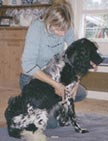Susan Davies of HandsOnHounds practises canine remedial massage therapy and is hoping to put it to good use on show and working dogs.
She trained originally to help humans with sports injuries, and holds a diploma in sports massage, which she gained with honours from the London School of Sports massage.
But after five years she decided to retrain, transferring her skills for the benefit of dogs and she now also holds a diploma (with distinction) in canine remedial massage therapy from the Institute of Complementary Animal Therapies.
Delighted with her new career, she is hoping to build herself a name and increase her Buckinghamshire-based business. Similarly to humans, she has found that dogs love being massaged, a process which can tone muscles, alleviate stiffness, improve circulation, eliminate toxins and – if the owner does it themselves – strengthen bonds.
Over a period of time it also creates feelings of security and tranquillity, thereby soothing nerves.
Susan’s aim is to increase public awareness about what can be done for their companion animals through massaging techniques. She treats all muscular and soft tissue problems and has learnt that animals can greatly benefit from massage, especially if it is performed post trauma, part of post-operation management care or simply because they are old, arthritic or stiff.
Remedial therapy uses massage and physiotherapy techniques to aid the management of or recovery from musculoskeletal problems and painful or debilitating conditions – for example, chronic osteoarthritis, muscle/tendon strains and back problems.
It relieves muscle spasm, pain and tension, increases the circulation, improves elasticity of muscles, mobility and suppleness of joints. It is also ideal for working dogs who need to keep mind and body in full working order such as police dogs, racers, guide dogs and assistance dogs. Agility competitors may also find her skills useful in keeping their dogs fit and fast.
All the owner needs to do is have their dog examined by a vet and ask him or her to refer the animal to Susan so therapy can start. Vets in Buckinghamshire are already getting to know her name and are sending her clients, who include a Rottweiler, Bernese Mountain Dog, Great Dane, Labrador, Min L/h Dachshund, Pointer and Weimaraner. Her skills also keep her ten-year-old Cavalier, Rupert, in tip-top condition.
Susan, a former flat-race jockey, explained why she changed the course of her career.
“Doing sports massage was strenuous and damaging my body, and because I have had a life-long passion for animals I decided to retrain,” she said.
“I found a course and it was an easy transgression due to my knowledge of anatomy and physiology – just a case of transferring that knowledge but employing a different approach and a different feel.
“Vets usually refer clients to me if they think it will benefit the animal; one of the vets who has been doing this is Mark Carpenter of Straid Veterinary Clinic in Beaconsfield who specialises in complementary medicine including acupuncture. I’ll get some history on the dog and then go back to the vet with some feedback after treatment.
“At the moment I am treating a Dandie Dinmont who has had spinal surgery and he is responding extremely well, even chasing his octopus toy with much enthusiasm.”
Susan can visit animals in their homes or they can be brought to her.
“Quite often it’s preferable to see the dog in its own surroundings because it will be nice and relaxed in its own environment,” she said. “I usually spend the first session getting him or her relaxed, and that can be done more quickly on home turf.
“I try not to take my hands off the dog so it feels secure. It’s so important to get them to relax – however long it takes – so healing can take place.
“Once that happens they really start to enjoy it. They seem to know that you are helping them – animals are very intuitive and most are very accepting. I haven’t found one dog who’s intolerant to what is being done. They may be in discomfort but they settle down quickly.
“Their anatomy is very similar to ours; they differ in that they don’t have a collarbone otherwise their muscular structure is identical.”
Susan’s skills can also help show dogs. Every year she spends at least two days at Crufts and this year being no exception.
“Show dogs can definitely benefit from the general technique I use, which is a brilliant way of releasing tension or muscle spasm,” she said.
Because show dogs are well socialised and used to different environments, Susan can treat them on the bench at the show.
“I can massage a dog or a puppy to calm him down before he goes in the ring and soothe him if he’s nervous. Alternatively I can stimulate him, getting his muscles warmed up, tuned and honed preparing him for a good performance in the show ring,” she said.
“Dogs who have had anterior cruciate ligament surgery can benefit, as can dogs who have back problems such as herniated discs. This is more common in long-backed breeds such as Dachshunds. Massaging will help the muscles either side of the vertebrae, release spasm and speed up recovery.”
Massaging supplies ‘the feelgood factor’, Susan says.
“This will help the dog if it’s nervous or highly strung,” she said. “But the process generally makes dogs more flexible and it can definitely introduce relaxed feelings.”
Owners who dread fireworks knowing the affect they have on their dog might also think of consulting Susan.
“Using massage to relax them may help them cope with the trauma,” she said. “It would not be a permanent, but it would induce a state of mind which would get them through.”
Susan charges in the region of £35 per session and can be contacted on 07973 845365 or email susan@handsonhounds.co.uk. Her website is www.handsonhounds.co.uk




